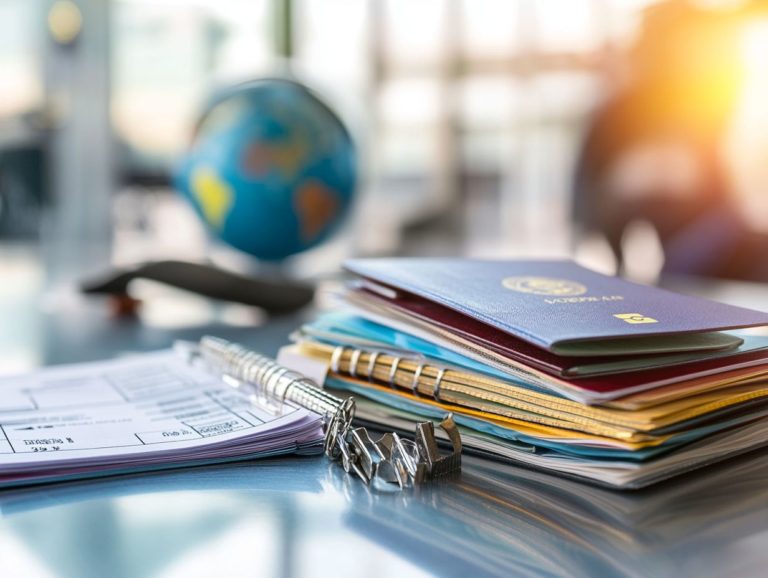How to Find a Host Family?
Staying with a host family is an exciting chance to dive into a new culture while forging meaningful connections.
This guide will walk you through the essential steps to research and select the perfect host family. We will highlight key factors to consider and offer insights on what to pack for your stay.
You will also discover how to cultivate a positive relationship and effectively navigate any challenges that may arise.
Embark with us on this journey as we delve into the enriching experience of living with a host family!
Contents
- Key Takeaways:
- Researching and Choosing a Host Family
- Preparing for Your Stay with a Host Family
- Building a Relationship with Your Host Family
- Dealing with Challenges
- Frequently Asked Questions
- 1. How can I start the process of finding a host family?
- 2. Are there specific qualifications for becoming a host family?
- 3. Can I choose the location or type of host family I want?
- 4. How do I communicate with my potential host family?
- 5. What should I consider when choosing a host family?
- 6. How can I ensure a positive experience with my host family?
Key Takeaways:

- Consider factors such as location, cultural compatibility, and family dynamics when choosing a host family.
- Pack accordingly and set expectations with your host family before your stay to ensure a smooth experience.
- Communicate openly and actively participate in cultural exchange to build a strong relationship with your host family.
Why Stay with a Host Family?
Staying with a host family presents a unique chance for cultural experiences. It offers you authentic travel experiences that foster deeper connections and a greater understanding of local customs.
A homestay allows you to immerse yourself in the family s daily routines and values. This creates a personal bond that enhances your journey.
Through this cultural learning, you re likely to gain insights into the local way of life, partake in family activities, and even share living space. This makes for a truly enriching adventure for anyone seeking to elevate their travel experience.
This arrangement deepens cultural experiences and provides a vibrant backdrop for language practice. For instance, in Canada, you might find yourself engaging in meaningful dinner conversations, honing your English or French skills while discussing local traditions.
Similarly, in South Africa, host families often extend invitations to family gatherings. This grants you the chance to experience vibrant cultures firsthand while practicing Afrikaans or Zulu in a welcoming environment.
These daily interactions offer a more fulfilling alternative to traditional accommodations. Opportunities to forge lasting friendships and create cherished memories may be limited otherwise. The warmth and guidance of a host family cultivate a sense of community, making each journey not just personal but profoundly transformative.
Researching and Choosing a Host Family
When you’re researching and selecting a host family, it s essential to leverage platforms like AuPairWorld and Workaway. These resources can help you connect with local hosts who align seamlessly with your personal goals and expectations.
Gaining insight into the values and routines of a potential host family can greatly enrich your homestay experience. This ensures that you find a match that complements your lifestyle and volunteer aspirations.
Factors to Consider
When considering a host family, several essential factors come into play, such as cultural adjustment, travel safety, and the various accommodation options available to you.
An effective host family will provide a safe haven and offer local insights that enrich your family volunteering experience. This fosters a positive attitude toward cultural exchange.
The geographical location of your host family greatly influences the activities available to you. Whether it s engaging in vibrant urban explorations or immersing yourself in the charm of rural customs and traditions, location matters.
Family values are equally vital. A host family that emphasizes community involvement is likely to encourage meaningful connections between you and the locals, deepening your cultural experience.
Understanding the daily rhythm and expectations of your host family like mealtimes, chores, and leisure activities ensures that there are no surprises. This makes the transition smoother and more enjoyable for everyone involved.
Aligning your expectations with those of the host family can dramatically enhance your overall travel experience. This leads to richer interactions and memories that last a lifetime.
Don t miss out on this unforgettable experience! Start your journey today by finding the right host family.
Preparing for Your Stay with a Host Family

Get excited! You’re about to create wonderful memories with your host family. Thoughtful planning is key when preparing for your stay, particularly regarding what to pack and setting clear expectations for your cultural learning experience.
Understanding the nuances of living together helps you navigate family routines and ensures a smooth transition into your host family s lifestyle, enhancing the benefits of your homestay.
What to Pack and Expectations
A well-crafted packing list is essential for a successful stay. Knowing what to expect will enhance your enjoyment of family activities and help you contribute to cooking or other household tasks.
Being prepared with some language skills and cultural insights enriches your cultural exchange experience and strengthens your bond with your host family.
When creating your packing list, include clothing that respects local customs and aligns with the family s traditions. This shows your respect and appreciation for their way of life.
Consider bringing small gifts, like local delicacies or handmade items from your hometown, to express your gratitude for their hospitality.
Clear expectations about your role in the household foster a supportive environment. This allows everyone to engage actively in conversations and activities, creating vibrant family dynamics that make the experience memorable for both you and your hosts.
Building a Relationship with Your Host Family
Building a relationship with your host family relies on open communication. This creates a cultural exchange that deepens personal connections and enhances your understanding of family dynamics.
Engage in shared experiences through family activities or casual conversations to enrich your stay and create meaningful moments for everyone involved.
Communication and Cultural Exchange
Effective communication strategies are vital for a rewarding cultural exchange with your host family. This allows you to practice your language skills and seamlessly integrate into their daily routines.
Share personal stories and remain open to conversation. This enriches your homestay experience and fosters lasting relationships.
To deepen these connections, utilize active listening techniques and cultivate genuine curiosity about their customs and traditions. Participating in family meals can unveil preferences around food that beautifully reflect their cultural heritage.
When discussing daily life, an open-minded approach helps you appreciate differing opinions and rituals, like celebrating unique local holidays or engaging in traditional activities.
Respecting their practices even if they differ from your own creates an atmosphere of mutual respect and understanding, bridging the gap between cultures and elevating your overall experience.
Dealing with Challenges

Navigating challenges during your stay requires a proactive approach to conflict resolution and cultural adjustment, all while embracing a positive mindset.
Understanding that flexibility in your travels helps you overcome potential misunderstandings is key. Adapting to new situations ensures that your experience remains enjoyable and enriching.
Tips for Handling Difficult Situations
When you face challenges, effective communication is key. Understanding family dynamics will help you navigate life with your host family.
Lean on help from friends and family. This support can greatly enrich your cultural experience and help you through tough times.
To create a peaceful environment, share your feelings openly. This encourages constructive dialogue and allows emotions to surface safely.
If misunderstandings arise, address them quickly with honest conversation. This prevents small issues from growing into larger ones.
Be aware of different expectations around customs and routines. Mutual respect is essential for a positive relationship.
Invite your host family to share their customs, and share yours in return. It’s a great way to bond.
Don’t hesitate to seek help from community resources. Programs like cultural orientation sessions or mentorship can provide valuable insights.
Frequently Asked Questions
1. How can I start the process of finding a host family?
First, research programs that offer host family placements. You can also ask your school or study abroad office for suggestions.
2. Are there specific qualifications for becoming a host family?

Yes, programs usually have age, income, and background requirements. Many require background checks and home visits for safety.
3. Can I choose the location or type of host family I want?
This depends on the program you choose. Some let you specify preferences while others assign families based on availability.
4. How do I communicate with my potential host family?
Once matched, use the program s channels like email or video chat. They might offer translation services if needed.
5. What should I consider when choosing a host family?
Look at their location, cultural background, and lifestyle. Check reviews or speak with previous students for insights.
6. How can I ensure a positive experience with my host family?
Before you arrive, discuss expectations and any concerns. Keep communication open and respect their rules during your stay.





